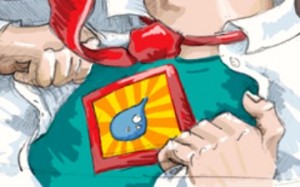Uncategorized

Web Content 102
As you have heard us say before, there are millions upon millions of online blogs and other informational websites, but what makes for great web content?
Clear and Concise
Being vague is one of the biggest mistakes a web content writer can commit, as it can compel your audience to instantly evaporate. No one wants to stay a second on something they find too complex or vague to understand. The mark of an expert lies in his ability to make complicated things clear and simple. Don’t use 200 words to say something that could easily be written with 50; people don’t have that kind of time these days.
Know Your Audience and Be Compelling
Know what your customers or general readers care about. If you think that your content can catch people’s attention because YOU are really passionate about the subject, you’re falling into the trap of assuming visitors will care because you care. Most people won’t spend a second on topics they don’t care about.
(…now it certainly does help to have a strong attachment to your topic, but you need more than just that!)
And “compelling” means that your web content not only grabs attention, but has purpose. Typically this is a sales conversion, but not always – especially on news-based blogs. Know what the end goal of your online copy truly is.
Accurate and Complete
The very first step is to create content that is accurate and complete. You need to ascertain that what you tell the world is correct. Information online is easily accessible today, but readers can easily spot posts or articles that were rushed and not fact checked pretty easily. If you don’t have the time to fully research your facts, like many business owners and others responsible for web content, find someone who does.
You also need to fully develop your ideas, or link to follow up information or action steps that make sense (such as a purchase option, if your content is made as a teaser).
And a good example is:
If you found this information helpful and would like to talk about ways to make your web content more compelling, contact us to learn more!

Six Things Social Sites Can Do To Keep Me Engaged
I try to check out as many new platforms, tools and services as I can. The vast majority of the time the technology is good enough and the idea is good enough, but the enterprise ends up falling flat for me. I’ll play with it a little bit, explore the different elements, but ultimately I find myself pulling away and going back to other places on the web. In thinking about it further, I’ve come up with a check-list of six questions that go into determining if this is a place I should be spending my time:
1. Who’s there?
Just about every site lets you connect with or invite your friends from Facebook, Twitter, etc. Great idea, makes sense. Or at least did make sense. But now I start to ask the question, “If s/he is my friend on Twitter, LinkedIn, Google+, Foursquare, Quora and Facebook, why am I connecting with them here as well?” There doesn’t seem to be any context, it’s just random friend tapping. Sure, sites can benefit from the network effect, but the failure to add a layer of relevancy makes this a hollow exercise. Rather than trying to ramp up with volume, I’d rather see sites incorporate Klout or PeerIndex to say, “these are your friends from other social networks who are experts/influencers/interested in the topic that this site is all about. Real world example: Why doesn’t GetGlue tell me “These are your Twitter friends who are really passionate about TV/Film/Books/Music.” That would end up making the GetGlue experience better because I’d either be following or inviting my existing friends who will actually use GetGlue.
2. How does it connect with my life online?
Every site allows me to push content to my Facebook or Twitter streams. But a good majority of the time I don’t want to do that. To paraphrase Jesse Eisenberg (as Mark Zuckerberg) “If I wanted to post on Facebook, I’d be on Facebook.” Surely there must be other ways to connect your site to my online life. Many sites offer widgets and badges, but that’s rather low end. I don’t have an answer here, but I’d love to see someone come up with something beyond the basics we see now.
3. How does it connect with my life offline?
Here’s where Nike+ (and the new Speedo Pace Club) have done a great job. It’s not just about checking-in via a Location-Based Service, it’s about integrating what I do offline with an online experience. Also, it’s niche, but a passionate niche. I’m not going to see everyone of my Twitter friends in these, only the ones that are really into running or swimming or whatever. I think these type of sites have a real chance to grow and survive.
4. What’s in it for me?
So many of these young sites pump up the interaction with gamification, but have an incredibly small payoff. How many digital badges and stickers am I going to collect? Why exactly do I want to be at the top of your leader board? Foursquare works well here because I’ve received plenty of real world rewards for my efforts – free appetizers, 20% off merchandise, etc. More sites need to figure out how they can reward their users in more tangible ways. I’m not going to run around telling all my friends they have to check out a site because they can earn a badge.
5. How are you connecting with me?
I get plenty of emails with news about the latest updates or metrics milestones from sites, but very few emails asking me about my user experience. I wish more sites would show an interest in me. Surely there must be a way to search my online web content and then communicate with me in a way that connects who I am with what your website is in a more meaningful way.
6. How are you surprising me?
Instead of another badge, how about something like, “For our first birthday, we teamed up with our friends at Ben & Jerry’s. Free ice cream for all our members, go print the coupon here!” That would be unexpected and quite welcome. I’m sure I could come up with a dozen “surprise and delights” in about 30 minutes. Give me a reason to keep coming back, make me want to know what might happen next because of my connection with you.
Bootstrapping an online venture is tough, I get that, but don’t forget to think about your potential user as much as you think about the offering itself.

Unique Social Media Promotion
0Social Media is creating many unique ways to market and promote companies – and causes. One of the coolest, recent ones:
Water.org is surrendering its Twitter account, @water, for an entire week to the user who racks up the most votes on its site.
To enter, you must be following @Water on Twitter. Then sign up to participate with a short message on why you’re right for the job. The public can vote until August 31 on who should get the keys to Water.org‘s Twitter car. The winner will control the Twitter account from September 5 to 11.
Considering @Water has more than 425,000 fans, the contest — called a “Twakeover” — is a pretty big deal.
“One of our core pieces of DNA is empowering people to make a change,” says Mike McCamon, Water.org’s Chief Community Officer. “The people in the developing world, we don’t just give them a well, they’re involved in it, it’s community driven.” Closer to home, Water.org encourages its audience to donate more than its money — the organization wants your voice and your social status, too. It was only fitting, says McCamon, to honor those efforts by donating Water.org’s own voice for a week.
Still, it’s a bit of a gamble. The contest could be spammed by someone looking to get more followers. The winner could go off on personal tangents. So McCamon and his team have drafted rules to prevent any cheating or reputation-busting tweets. “I want to protect ourselves from a Weiner moment,” McCamon says. The winner will send McCamon their tweets and he will either publish them unedited or withhold them altogether. You won’t see strings of profanity or offensive content.
But McCamon is confident that he won’t really have to do any policing. He trusts the Water.org community will choose someone passionate about water issues — someone who might do a better job talking about the issues than the company. “Every organization is looking to grow,” McCamon says. “In the [contest’s] top 10 there might even be people that would come work for Water.org. It allows the audience to self-select its ambassadors.”
So far the contest seems to be populated by people wanting to make a difference. Still, Water.org’s unfailing trust in its audience (and the Internet, for that matter) is a show of digital bravery. Even if the contest goes awry, the organization’s twakeover is an example of turning all those buzzy terms — brand loyalty, openness, empowerment, interaction, dialogue — and putting them into honest, unpredictable action.



